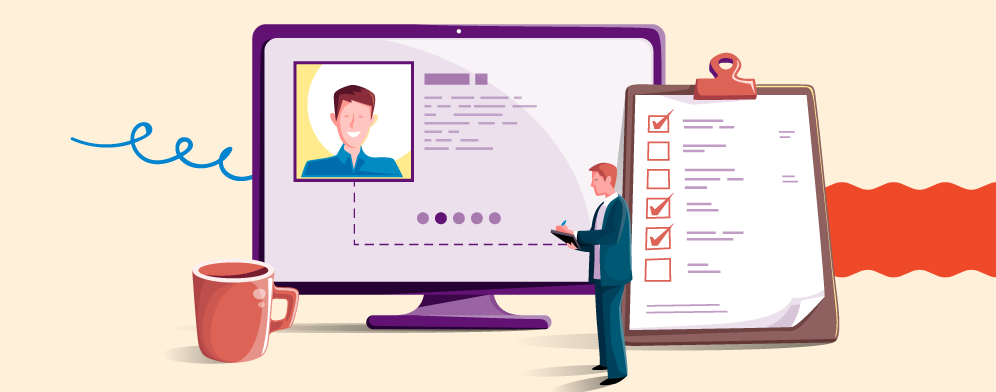1. What are the benefits of working remotely?

One of the reasons for working from home during Covid was due to health concerns. Even post-pandemic, health remains a key factor when considering work from home, particularly mental wellbeing. Remote working has been associated with a better work-life balance, and those who don’t report to an office are 12% more optimistic about the next five years than their peers. A recently published systematic review of the effects of remote work found that telework generally predicts higher job and life satisfaction, higher wellbeing, and greater productivity.
2. What does the interviewer want to know through this question?
The interviewer wants to ensure you understand the challenges of working remotely and have the necessary skills to deal with them. Furthermore, the prospective employer wants to determine if both your and their needs can be adequately met.
You might even rephrase the question as, “what does it mean when you work remotely?” Essentially, it means you don’t have direct supervision, you have to motivate yourself, you have to organize yourself, you have to be a good communicator and you need to be technologically literate.
It's important to demonstrate you can be trusted to work independently, with the adaptability to change your working patterns.
3. How to answer "Why do you want to work remotely?"

Now you know what’s expected, how do you go about demonstrating those skills? Here are a few points to start from when crafting your answer.
3.1 Research about the company and the job
The first thing to do is learn a little bit about the company and carefully read the job description. You may be able to discover more about the
organization’s approach to remote working and find out clues regarding what is expected from remote employees, as well as details about whether the position is hybrid working or fully remote.
Pay attention in particular to the company’s values. Modern companies typically have a value around “Work/Life Balance” or “Inclusivity”, both of which underpin the need for remote work.
3.2 List your reasons for choosing remote work
What does working remotely mean for you? Writing out your motivations for wanting to work from home will help you clarify in your own mind what the tangible benefits might be, such as removing office distractions, a more comfortable workspace and reduced environmental impact thanks to less travel. This not only ensures you are making the correct decision for your future, but may also help identify pros you can highlight to an employer (more on that below).
Alongside this, become clear on the extent to which you need remote work (and justify why) - is it a few days per week to help with school pickup/dropoff, or every day due to the commute or personal circumstances?
3.3 Identify the employer's benefits

Remote working has been shown to improve productivity as well as increase employee retention – both huge boons for employers. It can also increase wellbeing by increasing work/life balance and assisting to manage work/life conflict.It also means a greater pool of talent to
drawfrom if businesses don’t have to rely solely on candidates within a certain radius.
3.4 Align the employer's benefit to yours
Once you’ve listed your reasons for choosing to work remotely and the potential benefits to the employer, you can align the two together. For instance, you might want to reduce your commute because it’s stressful, time consuming and costly. By doing so, you’re also going to be fresher at the start of the day, therefore more productive.
3.5 Talk about your other qualifications and skills

Ask yourself, “what do I need to work remotely?” Good organization? Strong time management? Experience of using digital communication tools like Teams and Monday? Talking about your other qualifications and skills can show not only why you fit a role’s job description, but simultaneously illustrate that you have the necessary abilities to work from home effectively.
Modern companies that are hesitant with remote work, typically fear the impact on innovation and collaboration. This is a perfect opportunity to provide examples of tools and methods you have used, remotely, to enhance your innovation and teamwork.
If you have worked for previous companies in a remote role, emphasize your experience, and the knowledge you have of making that work effectively.
3.6 Demonstrate that you fit in the company's culture
Armed with your research about the company, you can speak directly to its culture. Perhaps you know that it has only recently started experimenting with remote working, in which case any experience you have already in this area could be invaluable to helping the company adjust. Most importantly, companies want to understand if you align with their values - demonstrate how this is the case, and how remote work can enhance this alignment.
3.7 Show your employer you are independent
Being able to work autonomously is one of the most important aspects of remote working. Show a potential employer you can work autonomously by discussing occasions when you had to problem solve without input from a line manager or worked on projects where you were directly responsible for delivering results.
3.8 Don't focus on only the remote benefits of the job
Remember not to focus only on how working remotely will benefit your wellbeing. While this will be important to most employers, it won’t be enough to impress them with your overall appropriateness for a role. Ultimately, you need to show how working remotely adds value not just for yourself, but for your team and the company, too.
4. Tips for answering “Why do you want to work remotely?”

Now you know what to include in your answer to “why do you want to work remotely,” here’s how you should prepare before the interview.
4.1 Prepare scripts of your answers
Preparing a script will make it easier for you to answer smoothly and fluently during your interview. Practice a few times to ensure it doesn’t sound rehearsed or staid. The question may be phrased differently, for example, “what do you prefer, working from home or office?” Make sure you are prepared for variations, either with a few different scripts or by simply tweaking a phrase or two here and there.
4.2 Be honest but positive

This might sound obvious, but don’t claim skills that you don’t really possess. For instance, if you’ve never worked asynchronously with colleagues in different time zones, don’t pretend you have, as you will almost certainly struggle down the road. Also, don’t feel like you have to conceal that you want to work from home because, for example, it makes childcare easier – this is a perfectly valid reason to want to work remotely, just make sure you frame the response positively, i.e., rather than, “working from an office is really detrimental to my family life,” say, “working from home makes it easier to manage my childcare responsibilities.”
4.3 Show confidence and a willingness to learn
You may or may not have experience with remote working already. Either way, you should exude confidence that you can work from home utilizing the skills in your arsenal. Even if you do not have training in a particular
software, most companies will not be averse to hiring you as long as you show a willingness to learn how to use new programs and adopt different methods of communication.
4.4 Be willing to compromise

Some companies prefer to conduct remote work trials with employees – both new and existing – before agreeing to a fully remote position. Don’t be put off if a business asks you to begin initially coming in a few days a week. Compromise is the foundation of any good relationship, and showing a willingness to prove that you are up to the task will build a basis for trust.
4.5 Practice
Yes, practice was mentioned above, but it’s so important, it’s worth mentioning again! The more comfortable you are with your scripts, the easier it will be to adjust them to any interview situation, so that you can reel off the key bullet points naturally.
5. Why Do You Want to Work From Home Sample Answer

To help you prep scripts, here are a few “why do you want to work remotely” sample answers for different scenarios.
5.1 Why Do You Want to Work Remotely Answer Focused on Productivity
“I’ve found that having my own home office space is conducive to increased productivity and allows me to more easily set aside time for deep work, free from the distractions that sometimes accompany traditional open-plan spaces. With the ready availability of tools like Slack and Zoom, it’s really easy to stay in contact with colleagues regarding ongoing projects, and they actually allow me to better visualize who’s working on what.”
5.2 Why Do You Want to Work Remotely Answer Focused on Flexibility
“Being able to set my own hours to some extent means I can assign my time more effectively. Personally, I’m quite an early starter, and during the morning when I’d usually be commuting, I instead get some of the daily admin tasks off my plate, before the main office hours begin. This way, I’m free later to focus on collaborative objectives and maximize hours spent on projects that require feedback or input from my peers.”
5.3 Why Do You Want to Work Remotely Answer Focused on Having No Experience
“Though I haven’t worked from home before, I understand it has become a core part of the XYZ Company ethos. I’m generally an organized self-starter, having worked individually on a project to optimize the SEO for our company website. I’ve also learned to use a number of different content management systems in the past, so I am used to picking up
new programs and would be happy to learn how to use the software currently employed at XYZ Company to facilitate work from home.”
6. FAQs
6.1 What not to say while answering "why do you want to work remotely?
Note that the sample responses emphasize how remote work benefits the individual and the company, while also gently touching on some downsides of office work. As mentioned above, you want to be as positive as possible, bringing into focus the dividends that can be achieved by work from home for everyone.
 Interested in Virtual Team Building Events?
Interested in Virtual Team Building Events?





















